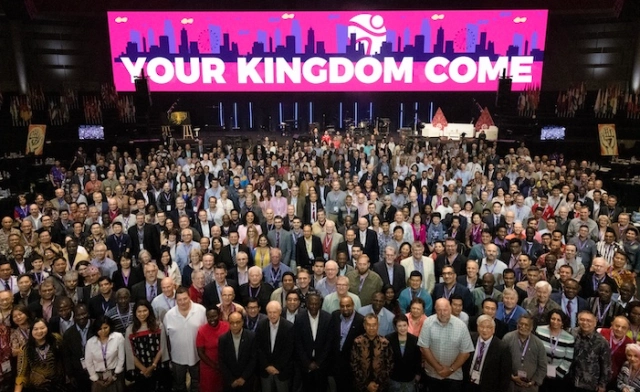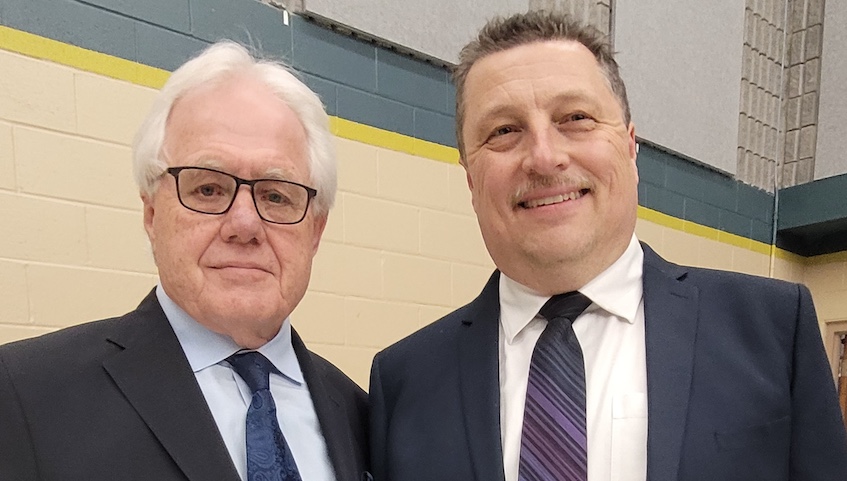Originally Posted on Dispatches from the Global Village

Forty years ago, evangelicals in Canada faced a problem, and because I had just been elected to head up their national association, it became my problem. It was this: since we did not have a Canadian voice to represent evangelicals, it was assumed that we matched those in the United States. Although we are neighbors to the United States, our cultures are different in some important respects. For example, evangelicals are a much smaller portion of the population in Canada than in the United States, so we are not in a position to influence political decision making as our U.S. friends do.
At the time, Jerry Falwell a Baptist pastor and head of the Moral Majority, was somewhat controversial, saying what obviously resonated for some American evangelicals. Since we had not yet developed a publicly recognised evangelical Canadian voice, in that information vacuum, the Canadian media assumed that he also spoke for Canadian evangelicals. This created confusion and misunderstanding as to what we believed and what we were trying to do.
We knew that to be an effective voice in our own country, we needed to develop our own national organization which we did under the umbrella of the World Evangelical Alliance (WEA), a global network embracing some 153 countries.
A global view
Now, 40 years later, David Guretzki has been installed as president of Canada’s Evangelical Fellowship of Canada (EFC), one of the 153 national alliances making up the WEA. As David set out his vision, it resonated with what I hear church leaders in other countries saying about their vision to bring healing and reconciliation in their own respective countries and to help in mobilizing their communities to be a Christ-centered witness and public voice for those they represent.

A remarkable development
But here is what so amazes me: nearly all 153 indigenously led national alliances have sprung up since the middle of the 20th century. What is remarkable is that this multiplying of national alliances was not so much driven by strategy, but by the Spirit of God. It has come about as church leaders felt the need to birth a means by which churches would speak together on matters of public concern and initiate help in times of crisis. Of course, this emergence has paralleled—and perhaps contributed to—an enormous global upsurge in the evangelical movement which it is estimated that in 1960, there were 90 million evangelicals worldwide and today, there are 650 million, or to see it another way, representing one-quarter of the world’s Christians.
Who then is the WEA, the World Evangelical Alliance?
Ironically, in view of the WEA’s considerable global impact, most people have never heard of it. This global network got its start more than 175 years ago, in 1846, when evangelicals from Europe, the United Kingdom and North America came together in London. Evangelical William Wilberforce had completed his incredible victory in ridding Great Britain of slavery in 1833. The evangelicals who assembled in 1846 had ongoing concerns about slavery, child labor and the persecution of Christians in Eastern Europe. But also––as one can glean from reading the original transcripts of their speeches in 1846––there was an underlying desire for evangelical leadership to bond together, breaking down walls that had kept them apart.
This formation came at an appropriate time. By the beginning of the 1900s, mainline Protestantism was embracing theological liberalism. This triggered a concern among more conservative Protestants, for evangelicals to come together on issues such as theology, Christian identity, and public witness. This led to churches and denominations cooperating on matters of Christ’s call to unity, public witness, and evangelism, and then, as the Pentecostal movement emerged, it sought for ways to foster a new openness in understanding the person and work of the Holy Spirit.
Ever since then, this wide-ranging and now global network has been a champion for the historic biblical faith, providing a distinct Christian identity and serving as a bridge to other churches and communions. Especially since evangelicals have no official representative like the Pope or an Orthodox patriarch, it is essential for someone to be their global voice—addressing important issues at the United Nations, battling for religious freedom for all people, speaking into halls of power on behalf of the persecuted, mobilizing cooperative action in our witness of Christ, and helping in times and places of natural or man-made disaster.
Of course, the WEA, as a global network, is mandated to address global issues and to help train and support alliances within their own country. So, in countries with a visible and viable national alliance, it’s those national alliance leaders who people tend to hear from. That’s why the WEA is relatively unknown, especially in countries where national affiliates are active, such as the EFC or in the USA, the National Association of Evangelicals.
When I took on this national leadership role for the EFC in the early 1980s, we knew, like our peers in many other countries, that it was both in the spirit of Christ and in our best interest to get along and collaborate. In this way, we all looked beyond our own local spheres of ministry and captured a wider vision of what it means to be a Christ-centered witness.
A new chapter is being written today among evangelicals. In a fractured world, there is strength in evangelical unity; in a noisy world, there is value in a clear and unmistakable voice; in a world of divided loyalties, Christ’s offer to foster love and unity has no match.
David Guretzki’s anointing for leadership of this Canadian alliance is an example of contemporary chapters being written in countries around the world.
Brian C. Stiller
Global Ambassador, The World Evangelical Alliance
April 2023




Stay Connected